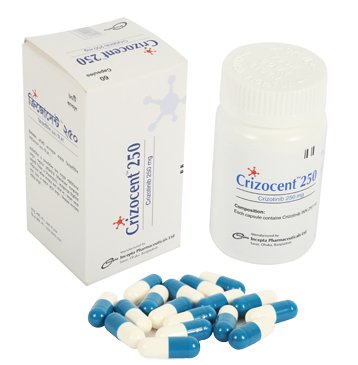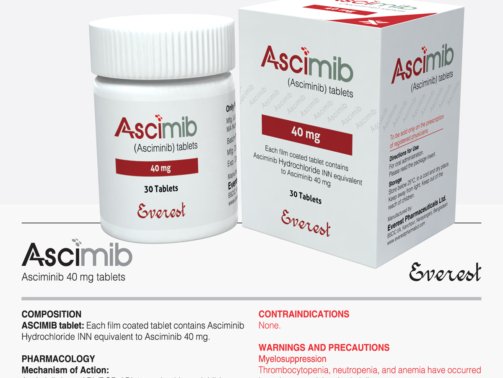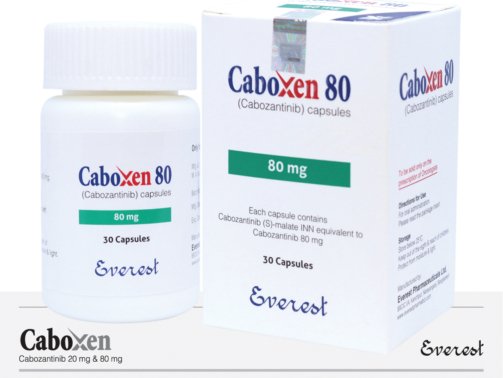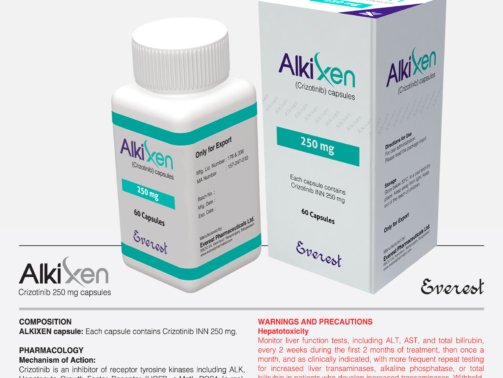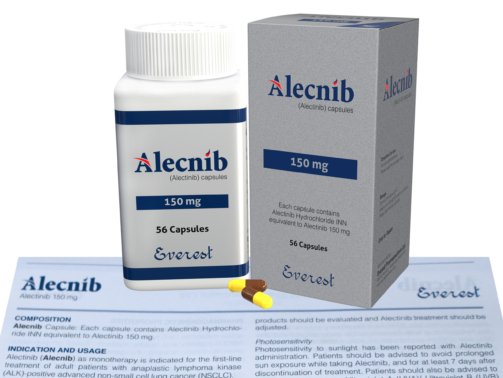Crizocent 250 mg (Crizotinib)
0.00$
Crizotinib is an inhibitor of receptor tyrosine kinases including ALK, Hepatocyte Growth Factor Receptor (HGFR, c-Met), ROS1 (c-ros), and Recepteur d’Origine Nantais (RON). Translocations can affect the ALK gene resulting in the expression of oncogenic fusion proteins. The formation of ALK fusion proteins results in activation and dysregulation of the gene’s expression and signaling which can contribute to increased cell proliferation and survival in tumors expressing these proteins. Crizotinib demonstrated concentration-dependent inhibition of ALK, ROS1, and c-Met phosphorylation in cell-based assays using tumor cell lines and demonstrated antitumor activity in mice bearing tumor xenografts that expressed echinoderm microtubule-associated protein-like 4 (EML4)- or nucleophosmin (NPM)-ALK fusion proteins or c-Met.
Crizocent 250 mg is a targeted cancer therapy medication that contains Crizotinib as its active ingredient. Crizotinib is classified as a tyrosine kinase inhibitor (TKI) and is primarily used in the treatment of certain types of non-small cell lung cancer (NSCLC). Manufactured under stringent pharmaceutical standards, Crizocent is designed to interrupt the growth and spread of cancer cells by inhibiting specific proteins involved in tumor development.
What is Crizocent 250 mg?
A prescription medication called Crizocent 250 mg targets aberrant proteins found in cancer cells, including mutations in the ROS1 gene and the anaplastic lymphoma kinase (ALK), which are known to encourage the growth of cancer cells. Crizocent significantly slows down or stops the growth of cancers by specifically inhibiting these proteins, increasing overall quality of life and providing patients with a more positive prognosis.
Active Ingredient and Composition
The contents of each Crizocent pill are:
250 mg of crizotinib
Quantum satis (q.s.) is an excipient that is needed to make the formulation.
To guarantee easy swallowing and regulated release of the active ingredient in the digestive tract, the tablet is usually film-coated.
Mechanism of Action
Inhibiting specific tyrosine kinases, which are enzymes that activate different proteins through signal transduction, is how crizotinib functions. It focuses on the aberrant gene rearrangements of the ALK and ROS1 genes found in certain cancer cells. Tumor formation results from these genetic mutations’ constant cell division and proliferation. By interacting to the ATP-binding site of these kinases, crizocent prevents this process, reducing their activity and stopping the spread of cancer.
Indications
250 mg of crizocent is recommended for:
ROS1-positive NSCLC that has spread
Patients who test positive for mutations in the ALK or ROS1 genes are frequently offered it as a first-line treatment. To verify the existence of these indicators, genetic testing is typically carried out prior to beginning treatment.
Dosage and Administration
The typical dosage of Crizocent that is advised is:
Oral administration of 250 mg twice daily (every 12 hours)
With or without food, the tablet should be eaten whole with water. To preserve the drug’s integrity, it’s crucial to avoid crushing, chewing, or splitting the pills.
Based on each patient’s response, tolerance, and the existence of side effects, the dosage may be changed. Always abide by the dose recommendations made by the prescribing physician.
Possible Side Effects
Crizocent 250 mg (Crizotinib) may have certain adverse effects, just like the majority of cancer drugs. Common side effects include the following, though not everyone experiences them:
Vomiting and feeling queasy
Either constipation or diarrhea
Weariness
Visual abnormalities (floaters, hazy vision)
Edema, or swelling
Increased liver enzyme levels
Slowed heart rate, or bradycardia
lengthening of the QT interval (alterations in cardiac rhythm)
Severe allergic reactions, liver damage, and interstitial lung disease are examples of more extreme adverse effects. Regular blood testing and physical examinations are used to closely follow patients throughout treatment.
Contraindications
It is not recommended to take 250 mg of crizocent in people who have:
A documented sensitivity to Crizotinib or any of the formulation’s ingredients
severe liver impairment (unless a doctor clearly advises otherwise)
Pre-existing cardiac rhythm problems or QT prolongation (take with caution)
Additionally, pregnant or nursing women should use it with caution and only if the possible advantages outweigh the dangers.
Drug Interactions
Other drugs, particularly those that impact liver enzymes (CYP3A4), may interact with crizocent. Among the possible interactions are:
Itraconazole and ketoconazole are antifungals.
Clarithromycin is one example of an antibiotic.
medications that prevent seizures (phenytoin, carbamazepine)
Products made from herbs, such as St. John’s Wort
To prevent negative drug interactions, always let your doctor know about all the prescription drugs and dietary supplements you are using.
Storage Instructions
Keep below 30°C in a cool, dry location.
Keep out of the sun and moisture.
Keep out of children’s reach.
Never use after the packaging’s stated expiration date.
Precautions and Warnings
Throughout treatment, it is advised to regularly check heart rhythm, liver function, and renal function.
Until you know how the medicine affects you, avoid driving or operating heavy machinery, especially if you feel dizziness or vision disturbances.
Limiting alcohol intake is advised because it can exacerbate liver strain.
Before beginning treatment, a doctor must be consulted regarding pregnancy and breastfeeding.
Conclusion
ALK-positive or ROS1-positive NSCLC patients now have a targeted treatment option with Crizocent 250 mg (crizotinib), a major breakthrough in customized cancer care. In precision oncology, crizocent has emerged as a favored first-line treatment due to its strong capacity to stop the proliferation of cancer cells. To guarantee patient safety and optimal effectiveness, it should only be administered under close physician supervision and close observation, just like any other powerful medication.
Order Now At Mdx Pharma bd….
To order from MDX Pharma BD, visit their website at https://mdxpharmabd.com, where you can browse products and place orders online. For inquiries or orders via email, contact emedicarepharma@gmail.com. Alternatively, call (+88) 01929123476. Their address is 29, Abdullahpur, Uttara, Dhaka-1230, Bangladesh.
1. Does crizotinib suppress ALK?
In both children [12], [13] and adults [14], [15], [16] with ALK+ ALCL, crizotinib, an inhibitor of ALK, ROS1, and MET receptor tyrosine kinases, has demonstrated therapeutic efficacy.
2. Is chemotherapy inferior to crizotinib?
Compared to chemotherapy, crizotinib is used in advanced ALK-positive lung disease.
In summary, this trial demonstrated that crizotinib, in contrast to chemotherapy, enhanced response rates, extended progression-free survival, and enhanced quality of life in patients with advanced, previously treated non-small-cell lung cancer that was ALK-positive.
3. What is the duration of crizotinib use?
Crisotinib is taken twice daily, in the morning and the evening. Crisotinib is typically taken for as long as it is effective and the side effects are manageable.
4. What is crizotinib’s success rate?
According to Supplementary Figure S2B, the median overall survival (OS) from the start of crizotinib was 53.4 (95% CI, 33.699−73.055) months. The corresponding 1-, 2-, and 3-year survival rates were 83%, 70%, and 57%.

 Cart is empty
Cart is empty 